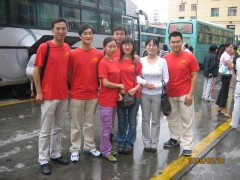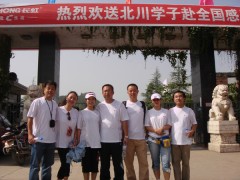Voices from the Sylff Community
Nov 25, 2008
Fellows Volunteer to Help China Earthquake Victims
The Tokyo Foundation had called out to the Sylff fellows in China for activities to provide relief to the victims of China’s Great Sichuan Earthquake. 2 volunteer teams centering on Sylff fellows were given financial support to carry out their activities. A report entitled “Sylff Fellows in China Support Great Sichuan Earthquake Victims,” which was written by a staff member of the Tokyo Foundation who observed their activities, had been uploaded to this site a short while ago. As the Foundation has now received reports from the Lanzhou University and Chongqing University volunteer teams, the following is a translated and edited version of their reports.
The Tokyo Foundation project to support prospective college students in Wen County
Zeng Xianghong / Project Leader Sylff Fellow, Lanzhou University
Project contents
Responding to the calls by the Tokyo Foundation, team leader Zeng Xianghong, a Sylff Fellow in the PhD program of the School of Politics and Administration, Lanzhou University, planned and made an application to conduct a project to support prospective college students in the No. 1 Middle School of Wen County, Longnan, Gansu Province (middle school also includes grades up to high school). This project was accepted for funding by the Tokyo Foundation. Activities were carried out at the school by a volunteer team made up of eight graduate students of Lanzhou University’s School of Politics and Administration.
 The goal of this project was to give materialistic and mental support to students of Wen No. 1 Middle School who were scheduled to enter four-year universities. The team departed Lanzhou by long-distance bus on the evening of August 20, and arrived in Wen in the afternoon of the following day. We immediately met with the school’s Vice Principal, Mr. Ma Meian, to discuss how to proceed with activities on the following day. We were initially scheduled to conduct activities for about three to four days, but after discussions with the school, it was decided to concentrate activities into one day due to fears of aftershocks, among others.
The goal of this project was to give materialistic and mental support to students of Wen No. 1 Middle School who were scheduled to enter four-year universities. The team departed Lanzhou by long-distance bus on the evening of August 20, and arrived in Wen in the afternoon of the following day. We immediately met with the school’s Vice Principal, Mr. Ma Meian, to discuss how to proceed with activities on the following day. We were initially scheduled to conduct activities for about three to four days, but after discussions with the school, it was decided to concentrate activities into one day due to fears of aftershocks, among others.
Participants in the relief activities conducted on August 22 were the eight volunteers of the team, Vice Principal Ma, General Secretary Mr. Yuan Xiaobin of the administrative department, five of the school’s homeroom teachers for third-year high school students, and the prospective college students numbering about 180. Not only did we distribute supplies needed immediately for school including schoolbags, notebooks, and pens, but a presentation was also made on university life. Guidance was given to provide understanding and to prepare the students mentally for university life. Explanations included tips on how to study, how to apply for scholarships, communication skills, and participation in social activities.
The students showed particular interest in how to mentally prepare for university life, stories of how the speaker matured while at college, as well as how to apply for scholarships. They listened very earnestly while taking notes. The students responded well, and it could be said that this time’s activity had the effects we had anticipated.
The students of Wen No. 1 Middle School came from areas all around Wen county, and some lived very far from school. About 20 students were not able to get to school until after the end of the day’s activities. We waited until they came and were able to directly hand over the supplies to them.
Response
Prior preparations—the team leader went to the school in the beginning of August for pre-inspection and detailed discussions on the activities—and carefully planned arrangements led to this project fulfilling its expectations.
We also fortunately received the positive support and cooperation of the school for the activities. Arrangements for the room and notification to the students were done efficiently, and the scheduling was done in a very thorough manner. The attention to detail in talks between the volunteers and the school in the preparation stage led to its success.
This time’s relief to the prospective college students differed from many relief activities in which main support comes in the form of supplies given to the beneficiary, which in most cases is a school. One of the key features of our project was to provide mental support, and the beneficiaries in this case were each individual student. This method was highly appraised by the teachers and students. In addition, we believe that this activity helped enhance our planning and organization capabilities. The Sylff fellows of Lanzhou University were able to communicate the spirit of helping people through this activity, and were able to realize in concrete form the empathy and support of the Tokyo Foundation to the Chinese people.
In retrospect
Impact of the earthquake
The lasting and most striking impression left on us was none other than the devastating impact of the Great Sichuan Earthquake. The earthquake hit on May 12, and over three months had passed when I went to Wen county at the beginning of August to prepare for our activities. Although partial restorations had been made for the direct damages of the earthquake, tents serving as temporary homes were present everywhere, from the roadsides to fields, mountains, and riversides.
Moreover, the destructive force of the earthquake not only took away many precious lives and assets, but continued to impact the lives of the people in the disaster-stricken region in the form of trauma and fears of aftershocks.
Wen No. 1 Middle School has three classroom buildings, but they need to be rebuilt due to extensive damage. Currently, the students are studying in temporary classrooms available through outside cooperation, but the learning environment is inadequate. The building that used to house the school’s administration has also been severely damaged, and is off-limits. The school’s staff members are working in the library where damages were comparatively light.
Our activities to aid Wen No. 1 Middle School were very limited in view of how much is needed to cope with the enormous destruction wrought by the Great Earthquake. However, we feel that it was very meaningful in that we were able to do something, however small, for the people of this disaster-stricken area.
Experience as the leader
I would like to take this opportunity to touch upon what I was able to experience by leading this activity. I had, up to now, participated in many hands-on social activities held by the university or my professors, but this was the first time for me to be a leader, organizing and putting a volunteer team to work. This experience helped me to better understand the purpose of the Sasakawa Young Leaders Fellowship Fund (Sylff), which aims to nurture leaders with a global vision. This time’s activity required many elements—proposing and planning the project, contacting Wen No. 1 Middle School, calling for volunteers, communicating with the Tokyo Foundation, coordinating implementation of the project, and precise action-taking and decision-making as the team leader. And during the conduction of activities, my skills of communication, foresight, and decision-making were tested. Luckily, my planned project went smoothly with very good results. I was able to secure the safety of the volunteers, and all the team members participated very willingly. I would like to thank the Tokyo Foundation for providing us with this precious opportunity.
The students of Wen No. 1 Middle School
In closing, I wish to relate my impressions of the prospective college students at Wen No. 1 Middle School. Within the various hardships and inconveniences brought on by the earthquake, this school was able to have a record-breaking number of its students pass the national college entrance exams: over 240 students passed the exams compared to last year’s figure of 165. Of course, this was partially due to the policy of the Chinese government to aid those students who were preparing for the exams in the disaster-stricken areas, but one of the major factors for this was, no doubt, the strong courage and spirit of the students who continued studying for their exams even after the earthquake.
On the day of the relief activities, we met with over 180 of these students. We were very moved by their deep yearning to go to college and their positive attitude toward university life. Over 90 percent of these students come from rural villages. Although we do not have any specific data regarding their household income, from what we have heard, we foresee difficulties arising in their households and life at the university. When we gave our presentation on university life, the greatest interest was shown toward scholarship systems and student loans. However, no matter what difficulties these students may encounter, I am certain that they will address these challenges with courage and perseverance.
Volunteer activities in the disaster-stricken region of Mianyang
Tang Songlin / Project Leader Sylff Fellow, Chongqing University
Introduction
My volunteer activity during the seven days in Mianyang city of Sichuan Province, a region suffering from damage by the Great Earthquake, was short but left a deep and lasting impression on me.
Through the assistance of the Tokyo Foundation, friends who shared my aspirations gathered to conduct volunteer activities aiming to provide mental support to the middle school students of Mianyang. The members of the team were, other than myself, He Guolian, a teacher from New Idea Training, Chen Yan, the General Manger of Chongqing Shanshui Travel Agency and lecturer, Li Lihui, a lecturer from Southwest University, Wu Meibao and An Xiaopeng, both graduate students of psychology at Southwest University, and Zhou Youlan, a designer.
Project Contents
Interviews
We arrived in Mianyang on August 20. On the following day, we visited an evacuation center in the suburbs of Mianyang and interviewed the people there, especially middle school students, to gain an understanding of their emotional state. At first, many of the students looked extremely calm and already recovered from their anguish over the earthquake, but while speaking to them, we came to understand that their minds were still in a dark shadow as they suffered from the deep scars of the earthquake. They were very confused and anxious about the future. We understood that what they desperately needed is not just concrete aid in the form of daily supplies, but aid that could provide them with strong belief and hope for the future.
This situation made us realize how valuable our volunteer activity was in its aim to provide mental support, and gave us a solid sense of confidence and determination.
Beichuan Middle School
 August 22. We went to Beichuan Middle School, the school that suffered one of the most serious damages from the earthquake. The earthquake had totally destroyed the original school building. The entire school, with its teachers and students, had moved to the training center of a major firm, Changhong, located in the suburbs of Mianyang. And this was where we went to meet and speak with the Beichuan Middle School students. When we began talking about the earthquake, many of the students were unable to hide their fear. The students also spoke tearfully of teachers who gave up their lives to save the students. It was a very emotional and moving experience. Counseling sessions were conducted by the experts on psychology in our team to help these children come out from the dark shadows cast by memories of the disaster.
August 22. We went to Beichuan Middle School, the school that suffered one of the most serious damages from the earthquake. The earthquake had totally destroyed the original school building. The entire school, with its teachers and students, had moved to the training center of a major firm, Changhong, located in the suburbs of Mianyang. And this was where we went to meet and speak with the Beichuan Middle School students. When we began talking about the earthquake, many of the students were unable to hide their fear. The students also spoke tearfully of teachers who gave up their lives to save the students. It was a very emotional and moving experience. Counseling sessions were conducted by the experts on psychology in our team to help these children come out from the dark shadows cast by memories of the disaster.
Because the damages at Beichuan Middle School were widely reported over the media, and since it was listed as one of the priority sites for reconstruction, it was receiving a great deal of domestic and foreign relief. Due to such reasons, after completing our work here, we decided to move our activities to another school that was more in need of aid.
Xiushui Middle School
August 23. We went to Xiushui Middle School in An county, which was under the jurisdiction of Mianyang city, to prepare for counseling work at the school. We also spoke with students in all grades on this day to hear about changes in their emotional state after the earthquake and problems they were facing in studying and daily life. A survey using a questionnaire was conducted on about 200 students. This survey was conducted to gain a deeper and broader understanding of their mental state.
August 24. We analyzed and sorted the data obtained from the questionnaires completed by the students, and based on the results, formulated specific plans for the counseling sessions. After this, we purchased what materials were necessary for the sessions, and conducted a mock counseling session.
August 25–26. Counseling was conducted for two days at Xiushui Middle School. Because the earthquake had damaged lodging facilities in the area around the school, we were unable to stay overnight there, and had to spend the nights in Mianyang. We made the two-hour trip to the school every day by bus.
Based on personal experience, the professional counselor on our team planned and conducted four counseling sessions tailored to the middle school students. These were “Adjusting your mental state and recovering your dreams,” “Communication and cooperation,” “Trust and responsibility,” and “Being thankful.” The volunteers joined the students to participate in the sessions.
Through the “Adjusting your mental state and recovering your dreams” session, the students were able to reduce their fear of the earthquake and gained more hope and receptiveness for the future. There was also more enthusiasm to participate in this activity. In the following two sessions, “Communication and cooperation,” and “Trust and responsibility,” group activities were conducted to raise teamwork and increase the students’ sense of responsibility and mission. In the final session, “Being thankful,” the students relaxed to soft music while listening to a reading by the instructor.
We sensed that the sessions helped the students release their long hidden emotions. Many of the students had a good cry. Teachers and parents who were watching the activities also cried as they hugged the students. Watching this scene unfolding before us, we couldn’t hold back our tears either.
Even after the end of the two-day session of activities, the students would not leave us and spoke eagerly about a lot of things. We were very moved by this. We also told the students about our impressions of the activity. We exchanged information on how to contact each other and bid our farewells. It was already past 10 o’clock when we returned to Mianyang, hungry and tired but still very excited and moved by our experience with the students.
Response from the students
With the completion of our activities, we returned to our universities and companies, but many emails still arrived from the students. They wrote about their studies, dreams for the future, and expressed their appreciation to us. We were relieved and very happy to hear from them. Of course, this was not because we expected to be rewarded. It was with a deep sense of relief that we were able to see that the seeds of love had been firmly implanted in their hearts and had flowered into new hopes for the future.
Where there is love, there is hope. We believe that a better and brighter future is in store for those in the disaster-stricken areas, and for the world as well.
Message from the Tokyo Foundation:Why don't you write an article too?
“Voices from the Sylff Community” is a space showcasing the activities and opinions of Sylff fellows and faculty members. We have received contributions from fellows and faculty members all over the world. We are looking forward to sharing YOUR voices with people around the world, including global issues with local perspective, grassroots issues requiring global attention, and your first-hand experience.
For further details, please click here.
